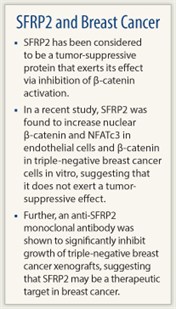Secreted frizzled related protein 2 (SFRP2), a protein that modulates the Wnt signaling pathway and is involved in embryonic development, has been thought to exert a tumor-suppressive effect via inhibition of β-catenin activation. However, researchers at the University of North Carolina at Chapel Hill have found that SFRP2 promotes angiogenesis by activating NFAT, a transcription factor that stimulates angiogenesis and tumor growth. On the hypothesis that SFRP2 is an oncoprotein rather than a tumor suppressor, these investigators assessed the effects of the protein on the Wnt pathway in breast tumor and endothelial cells and the effects of SFRP2 antagonism on breast tumor growth in vivo. Lead author Emily M. Fontenot, MD, presented the team’s findings at a plenary session of the Society of Surgical Oncology Annual Cancer Symposium, in Orlando, Florida.1
Study Design
 To test effects on the Wnt pathway, human triple-negative (estrogen-, progesterone-, and HER2 receptor–negative) breast cancer cells (MDA-MB-231) and murine endothelial cells (2H11) were incubated with recombinant SFRP2 or control medium and nuclear samples were probed by Western blotting for NFATc3 and β-catenin. It was found that SFRP2 increased nuclear β-catenin and nuclear NFATc3 in endothelial cells and β-catenin in breast cancer cells.
To test effects on the Wnt pathway, human triple-negative (estrogen-, progesterone-, and HER2 receptor–negative) breast cancer cells (MDA-MB-231) and murine endothelial cells (2H11) were incubated with recombinant SFRP2 or control medium and nuclear samples were probed by Western blotting for NFATc3 and β-catenin. It was found that SFRP2 increased nuclear β-catenin and nuclear NFATc3 in endothelial cells and β-catenin in breast cancer cells.
To assess effects of SFRP2 inhibition in vivo, human triple-negative breast cancer xenografts (MDA-MB-231) were established in mice. Treatment with buffer control, the antiangiogenic agent bevacizumab (Avastin), or an anti-SFRP2 monoclonal antibody was started when average tumor size was 200 mm3, and tumors were harvested when tumor diameter reached 2 cm or at 28 days. Treatment with anti-SFRP2 monoclonal antibody resulted in a significant 54% reduction in tumor volume compared with control (P = .03). Bevacizumab treatment resulted in a nonsignificant 32% reduction in growth compared with control (P = .32). No effect on tumor growth was observed with an IgG-negative control treatment.
Therapeutic Target
 The finding that SFRP2 activated both β-catenin and NFATc3 in endothelial cells and β-catenin in breast cancer cells suggests that SFRP2 is not a tumor suppressor. Further, as stated by the investigators, “SFRP2 antagonism with a monoclonal antibody resulted in a reduction in breast tumor growth in tumors that were [relatively insensitive] to bevacizumab. This suggests that SFRP2 is a therapeutic target for breast cancer.”
The finding that SFRP2 activated both β-catenin and NFATc3 in endothelial cells and β-catenin in breast cancer cells suggests that SFRP2 is not a tumor suppressor. Further, as stated by the investigators, “SFRP2 antagonism with a monoclonal antibody resulted in a reduction in breast tumor growth in tumors that were [relatively insensitive] to bevacizumab. This suggests that SFRP2 is a therapeutic target for breast cancer.”
Nancy Klauber-DeMore, MD, principal investigator for the study, noted “This is our second study that has demonstrated the antitumor effects of SFRP2 antagonism. We recently presented findings at the Association of Academic Surgeons meeting showing that the SFRP2 monoclonal antibody inhibits the growth of angiosarcoma tumors in vivo. Our future studies will focus on studying the role of SFRP2 on tumor growth and Wnt signaling in a wide variety of tumor types.” ■
Disclosure: Dr. Klauber-DeMore and coauthor Dr. Cam Patterson have cofounded Enci Therapeutics, Inc, to support the clinical development of a monoclonal antibody to SFRP2 for cancer.
Reference
1. Fontenot EM, Mumper R, Shen X, et al: Therapeutic targeting of SFRP2 is a strategy to reduce triple negative breast tumor growth. Society of Surgical Oncology 65th Annual Cancer Symposium. Abstract 4. Presented March 23, 2012.

